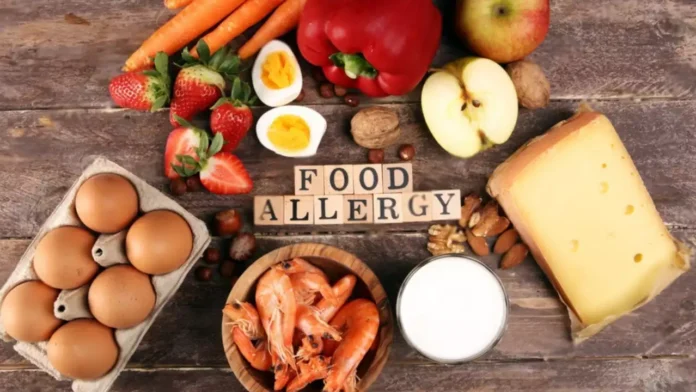For people dealing with multiple food allergies, recent research indicates that a medication already sanctioned for asthma and chronic hives could safeguard against severe reactions to peanuts, eggs, milk, and other food items.
In a preliminary examination of data from a clinical trial supported by the National Institute of Allergy and Infectious Diseases, 165 children and adolescents who were administered injections of the drug Xolair could tolerate higher doses of the foods without triggering an allergic reaction. This was in contrast to those who received placebos, as explained by Dr. Alkis Togias, chief of the allergy, asthma, and airway biology branch at NIAID.
Addressing Multiple Food Allergies:
“The major advantage of this medication is that it will cover more than one food and that it has been around for about two decades and we know its safety profile, which is pretty good,” Togias said.
The monoclonal antibody omalizumab, marketed as Xolair and developed by Genentech and Novartis, is already accessible as a remedy for asthma. The medication demonstrated efficacy in diminishing allergic asthma attacks and hives during clinical trials.
On December 19, the NIAID and Genentech announced that the Food and Drug Administration was fast-tracking the approval of the injectable medication for protection against accidental exposure to foods.
As the drug has received FDA approval for asthma, it can currently be prescribed off-label to patients. However, doctors noted that obtaining clearance from medical centers and securing insurance coverage for a prescription for food allergies might pose challenges.
The monthly cost for Xolair in treating allergic asthma is approximately $3,663, with the average person using the medication for about 10 months, according to Genentech spokesperson Lindsey Mathias. For chronic spontaneous urticaria (chronic hives), the monthly cost ranges from $1,323 to $2,646, depending on the dosage.
Full approval of the medication by the FDA as a treatment for food allergies would help with insurance issues, Togias said.
“Insurance companies may still balk even when FDA approval is granted, it will be more difficult for them to do so if there is an approved indication,” he said.
Approximately 2% of adults and between 4% and 8% of children in the U.S. experience food allergies, as per the USDA. Anaphylactic shock triggered by the consumption of an allergen leads to 30,000 emergency room visits, 2,000 hospitalizations, and 150 deaths each year.
“About 40% of people who have food allergies are allergic to multiple foods,” Togias said.
Numerous small studies have indicated the medication’s protective properties, but obtaining FDA approval required a large-scale clinical trial.
In the trial description on clinicaltrials.gov, researchers were actively recruiting individuals with a peanut allergy and allergies to two additional foods known to induce adverse reactions, such as tree nuts (cashew, hazelnut, or walnut), milk, and eggs. Participants aged 1 to 17 were included, alongside three adults aged 18 to 55, all of whom had a confirmed allergy to peanuts and at least two other prevalent foods, as reported by the National Institutes of Health.
In the initial phase of the study, participants received 600 mg of peanut protein, roughly equivalent to two-and-a-half peanuts. They were also administered 1,000 mg of egg protein, equivalent to one-fifth of a raw egg, or 600 mg of milk protein, roughly equal to an ounce of uncooked milk.
Discover More Content: Is your kid allergic to eggs? Here’s Why Chicken Apple Stir Fry is the Perfect Breakfast Solution!
Participants were also subjected to a dosage containing a combination of proteins from various foods known to trigger allergic reactions.
The potential approval of Xolair for food allergies has been a long-anticipated development, noted Dr. Joyce Yu, an expert in pediatric allergy and immunology at Columbia University’s Vagelos College of Physicians and Surgeons.
FDA approval could potentially “simplify life for both doctors and patients,” remarked Yu, who mentioned that she hasn’t prescribed the medication off-label due to challenges in obtaining permission for its use.
“This would be a helpful option for parents who feel stuck between a rock and a hard place,” Yu said.
Dr. Cosby Stone, an assistant professor in allergy and immunology at Vanderbilt University Medical Center, elucidated that the medication, a synthetic antibody, functions by suppressing a component of the immune system known as IgE. IgE is released in excess when the body erroneously identifies an allergen as a parasitic infection.
A medication capable of reducing the sensitivity of allergic children to common foods “would be extremely beneficial for children, particularly toddlers, and their parents, given the challenge of preventing kids from any form of exposure,” expressed Stone.
“There’s already evidence out there in cohort studies that show that it tends to protect people from severe reactions,” Stone said. “But I think everyone in our field would be thrilled to have evidence from a randomized controlled trial.”
The FDA refrained from commenting on the approval status of the medication. However, NIAID and the two pharmaceutical companies recently declared that the FDA had given priority review for Xolair.
The initial analysis indicated that Xolair substantially raised the threshold for triggering an allergic reaction to peanuts—the primary objective—as well as to milk, eggs, and cashew in children and adolescents with food allergies, explained Dr. Larry Tsai, global head of respiratory, allergy, and infectious disease product development at Genentech, in an email.
The complete results of the trial are anticipated to be published in a medical journal in late January or February.
FDA approval could potentially occur in the first quarter of 2024, according to Togias.
For Tsai, the trial results hold a personal significance as he himself has food allergies and is also a parent to a child with severe food allergies.
“I know firsthand how challenging it is to cope with this condition and to live in continued fear of an accidental exposure,” Tsai said.


